Writers Rebel is born
On 11th October, the new campaigning group XR Writers Rebel held its first event in Trafalgar Square as part of Extinction Rebellion’s October Uprising
For news and updates, follow Writers Rebel @XrRebel on Twitter, and our Facebook page
Short film by Simon Spence
How many literary event organisers learn, at three hours notice, that their stage and their PA system have been stolen? By the police?
The launch of Writers Rebel in the middle of an Extinction Rebellion protest in central London was always going to be the oddest, wildest, most chaotic gig any of us had been to, let alone coordinated.
Not that any of us have coordinated one before.
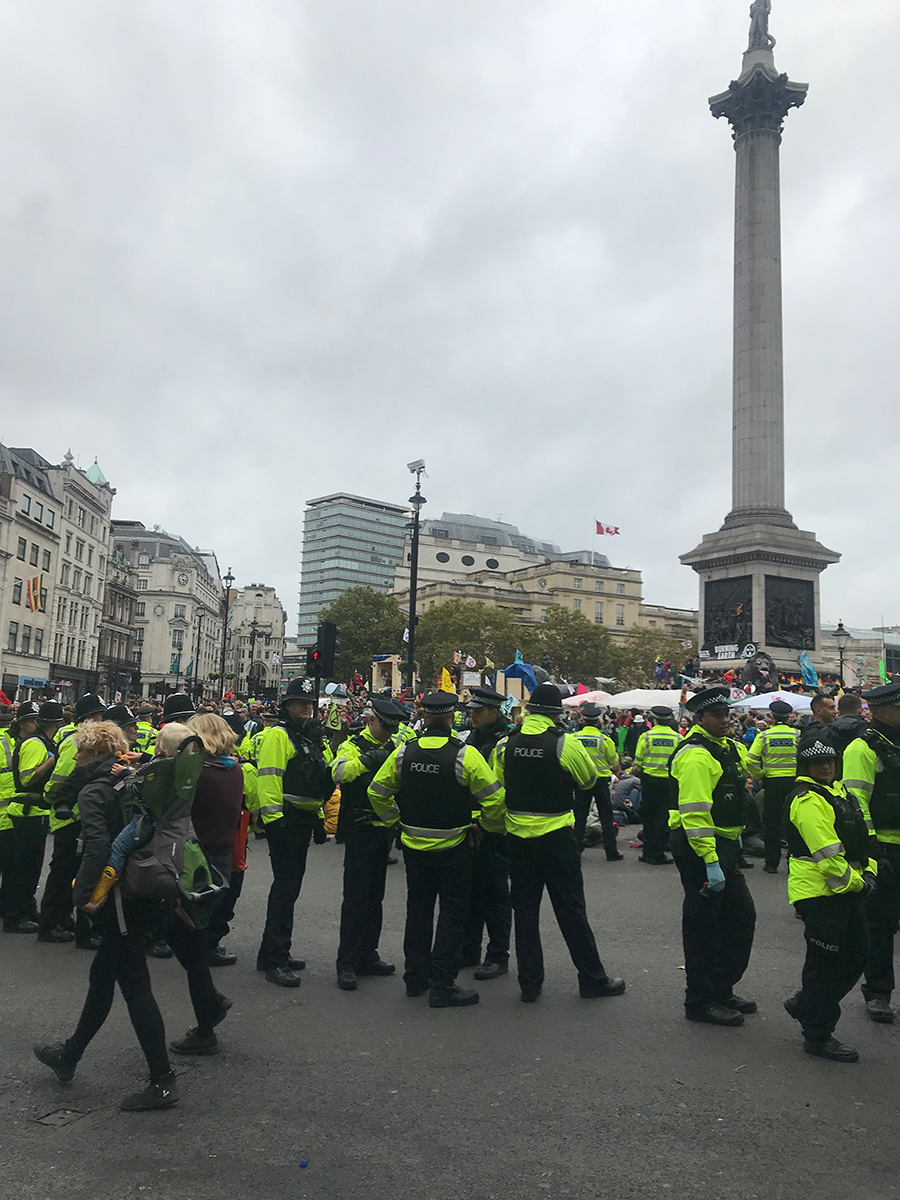
But here we are in Trafalgar Square during Extinction Rebellion’s 2019 October Uprising, a seven-strong posse of novelists, poets, screenwriters and film-makers who are also variously academics, Buddhists, podcasters, book reviewers and PR execs, learning to be activist-impresarios on the hoof. Two of us are parents of young XR arrestees awaiting trial. One of us lives four months a year off-grid. Another of us grew up in an eco-activist household. One of us has a brother whose home and life were wrecked by flood. We are from Trinidad, London, Australia, Scotland, Mexico and Denmark. None of us eats meat. It’s quite the Venn diagram. Not that we’ve had time to draw it: we’re too stressing about what might go wrong.
Conjuring a four-hour marathon of five-minute performances – outdoors, in October, in the middle of an illegal protest – suddenly seems like a lunatic plan. We cooked this thing up only six weeks ago and we still barely know each other. Writers aren’t natural joiners and we’re no exception. But now here we are on the brink of staging something huge, at the heart of something even huger, to fight for the hugest thing of all: the future of the Earth.
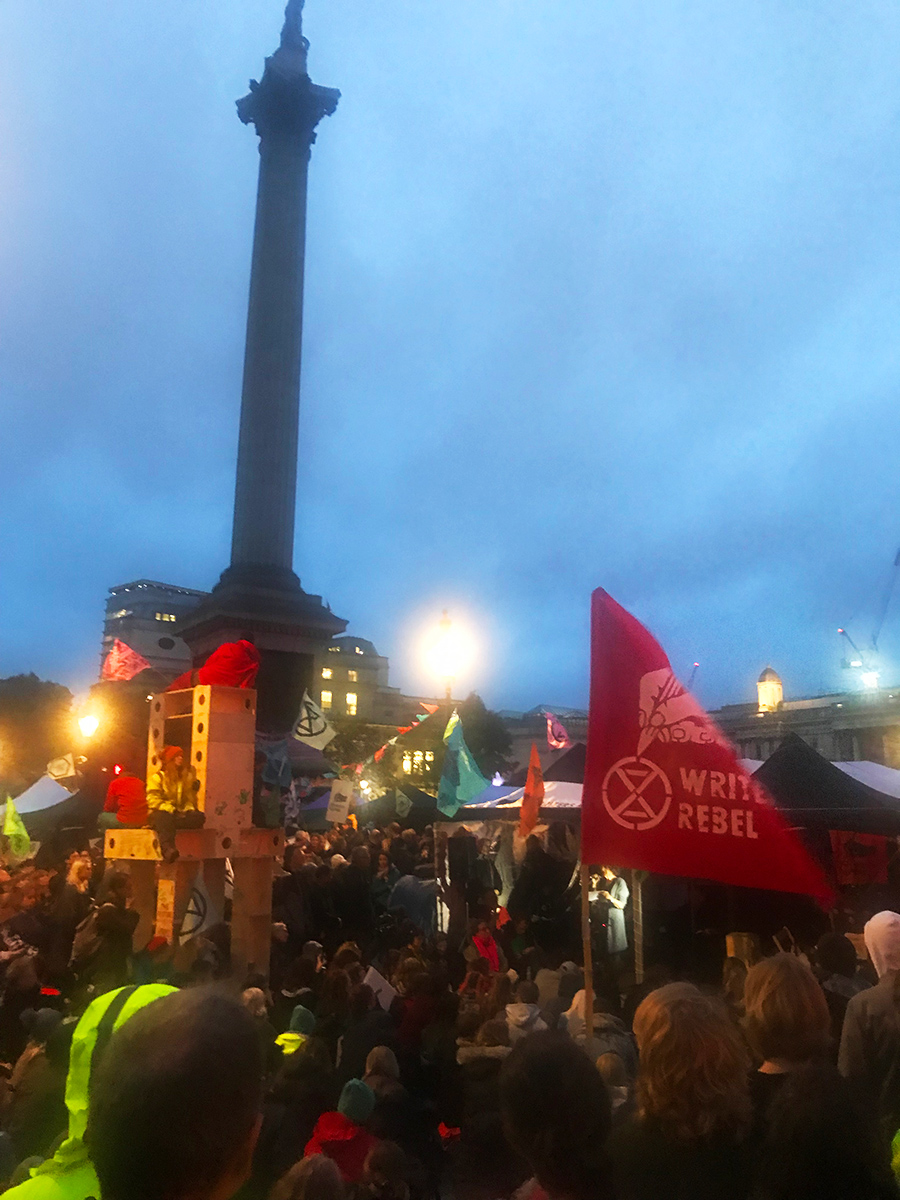
Even though many writers, publishers, agents and readers have leaped to support us, we’ve been detecting a look on their faces that expresses the thing we most fear ourselves: that our enterprise is doomed to fail – not just in the common-or-garden “that wasn’t such a hot gig” way, but in a way so abominable and grotesque that it will haunt us for the rest of our literary careers.
Naomi Alderman, Irenosen Okojie, Ali Smith, Susie Orbach and Robert MacFarlane are coming. AL Kennedy and Simon McBurnley have agreed to compere. Margaret Atwood and Amanda Palmer and our unofficial patron saint Amitav Ghosh have sent messages of support. Zadie Smith has recorded a beautiful piece for us to put out on social media. There’s a rumour that Neil Gaiman and Stephen Fry are rocking up.
It’s 2pm, we start at 5, and we still don’t have a stage or a sound system. One of us knows someone whose gazebo might be free, so while the rest of us assemble flags and placards and tick names off a clip-board, she scrambles to make it happen.
We’ve promised a bunch of major writers there’s almost no chance they’ll be arrested, because silencing writers is never a good PR move, but with Boris Johnson as Britain’s new, rogue Prime Minister, what do we know? We now have a loaned gazebo and a sound system but no backup plan if the cops kick us out because despite noises of goodwill from many a large institution supportive of literature – including some who have declared their own climate emergency – when push came to shove, they’ve all said no.
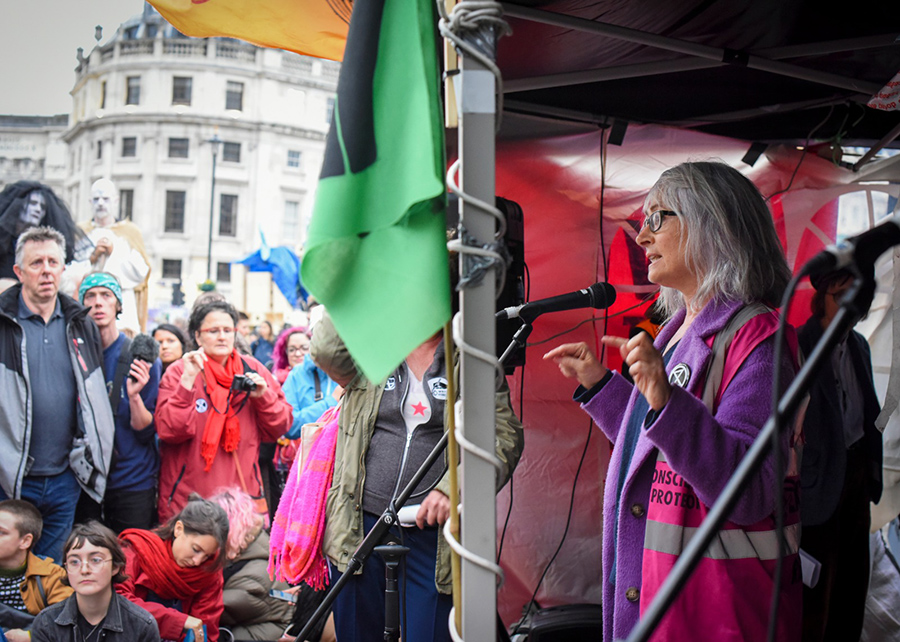
Screenwriter Jessica Townsend from the Writers Rebel team
It’s 4.30 pm and we’re supposed to start at 5. Heavy rain is forecast. One of us is roaming the Square accosting tall strangers and begging them to help tie our Writers Rebel banner to the roof of the gazebo. (Where else but at an Extinction Rebellion uprising would a couple on stilts materialize to save the day?) Our timings are already tight – five minutes each, twelve writers an hour – but when our fellow activist Natasha Walter, who has just come out of a police cell, offers to read, how can we say no?
And then it’s upon us. We each say a few words about why we’re here – hurricanes intensifying in the Caribbean, the need for writers to get off their backsides once in a while, the impossibility of doing nothing – and the next thing we know, it’s underway. Literary types are not unknown for their egos but if our performers have them, they’ve parked them at the door. Not that there is a door – unless you count the entrance to the Waterstones bookshop where the entire pop-up is forced to decamp in Hour Three, after the rain tips down so Biblically that Simon Schama risks being electrocuted in full flow.
And so it comes to pass that for four and a half hours, writers including Ali Smith, Naomi Alderman, Philip Hoare, Susie Orbach, Owen Sheers, AL Kennedy, Robert McFarlane, Leone Ross, Dajlit Nagra, and Salena Godden mesmerize an audience of up to a thousand people (a couple of hundred of them police) with passionate, elegiac and heartbreaking works of poetry, fiction and prose.
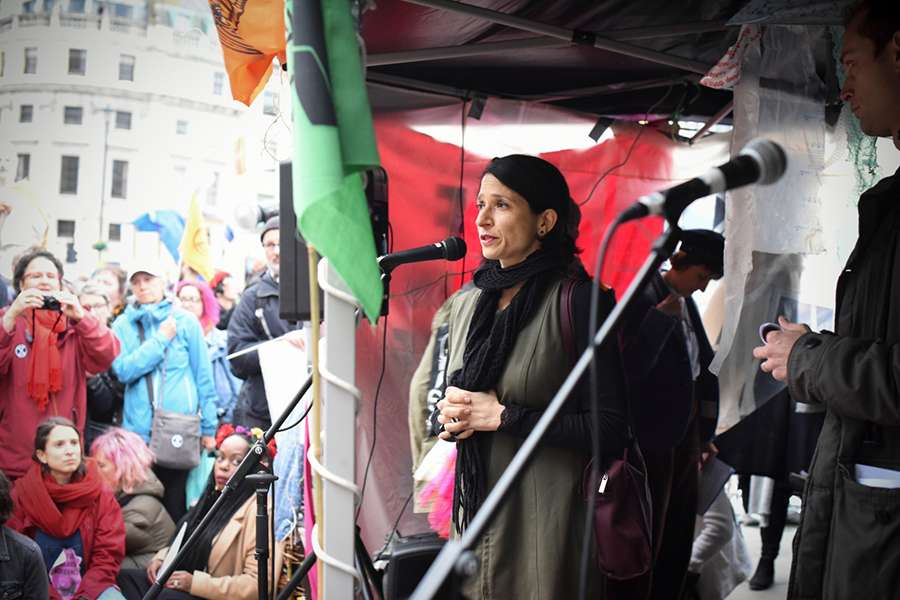
Novelist and Writers Rebel team-member Chloe Aridjis addressing the audience in Trafalgar Square
Among the high points: Robert Macfarlane reading a poem by the young indigenous poets Kathy Jetnil-Kijiner from Greenland and Aka Niviana from the Marshall Islands; Ali Smith urging everyone to break into a song of ‘One Planet Earth’ to the tune of Cuba’s most patriotic song, Guantanamera; Philip Hoare reproducing the clicking noises made by whales; Salena Godden’s written-for-the-day eco rant which she then balled up and threw into the crowd, and the ingenuity, charisma and generosity of our comperes, Simon McBurney from the Theatre de Complicité and the novelist and stand-up comic A.L Kennedy.
It happened. And it worked. Not only that, but the evening turned out to be the most authentic, the most heartfelt, and – yes, we might just go to our graves saying this – the most fun occasion we’d had in our combined hundred-plus years in the writing business.
We aren’t alone in thinking that. Most of the writers who participated felt it too: that exhilarating buzz of feeling vital, alive, active – and part of something so much bigger and more important than ourselves. Which makes us all glad that we persisted, though all those Zoom meetings, through those fierce arguments and emoji-littered What’s App exchanges, through all those phone calls and emails, through all that shuffling of names on corkboards in Copenhagen and London and Manchester, while Brexit whirled in the background like a great tornado we were determined to ignore.
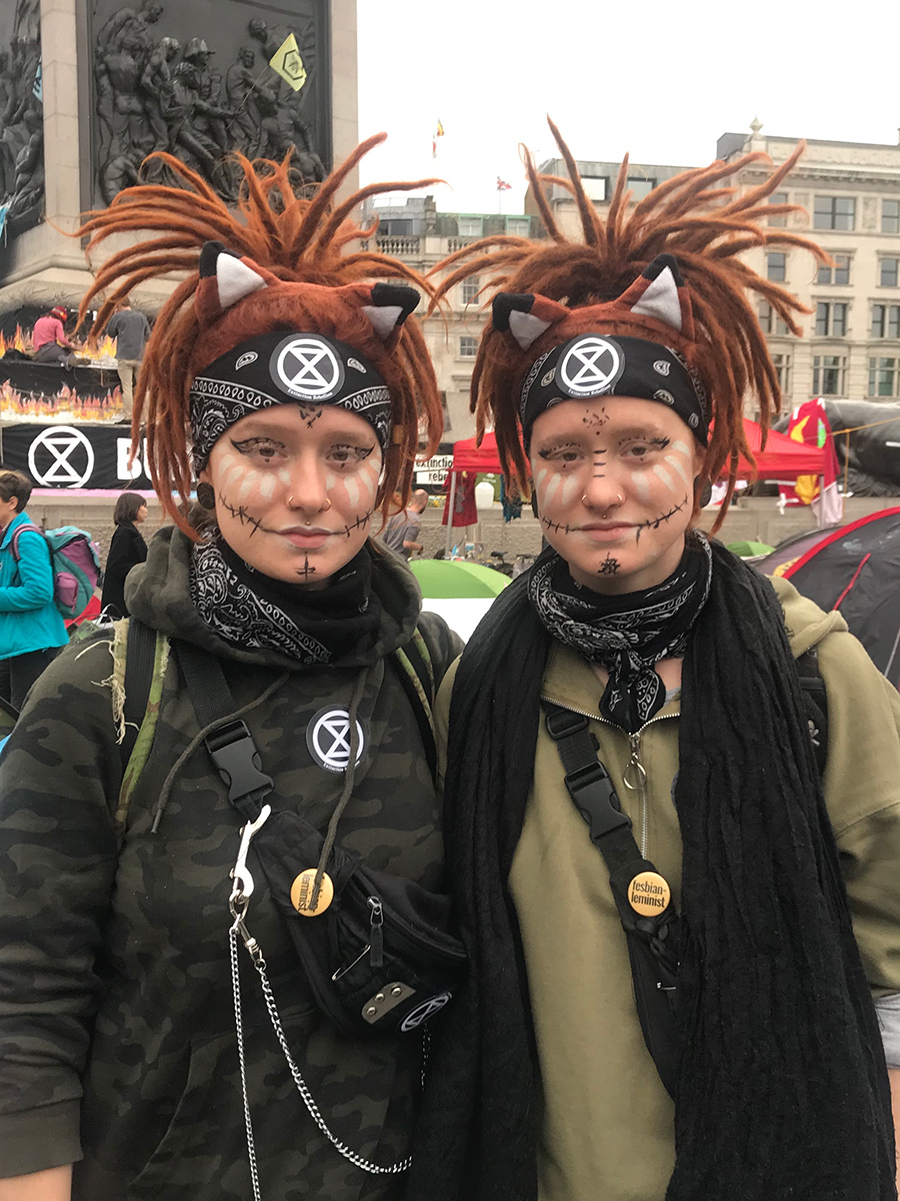
The Hay-on-Wye Festival it was not
Three years ago Amitav Ghosh published The Great Derangement, in which he claimed that literature was failing to rise to the occasion of the climate emergency. It was a failure of the imagination, of art, of culture itself. That made a few of us angry – not because he was wrong, but because he was right. What he wrote haunted us. We had so little time left. Could writers really make a difference?
Maybe not. But we could try.
We did talk about that, a lot, when we first came together: it was the one thing that united us, apart from our natural attraction to the tactics (and results) of Extinction Rebellion, a movement less than a year old which, like Fridays for Future, is already not just changing but dictating the conversation.
All of us at Writers Rebel believe that literature can play an important role in the ongoing emergency, and we cherish our place in the urgent, beautiful, burgeoning grassroots movement that is Extinction Rebellion. In embracing their spirit of improvisation and their creative flexibility we ended up with a joyous, chaotic marathon literature festival in the heart of Britain’s capital city: a literary gig in the midst of a rebellion. We feel proud.
So what next?
October 11th was never intended to be a one-off event. In the planning stages, the enthusiastic response we had from writers, readers, booksellers, agents and publishers told us there was a vast appetite for more. Extinction Rebellion, Greta Thunberg and Fridays for Future have mobilized more people in a few short months than any green campaign group movements have ever done before, despite decades of tireless campaigning. We felt the warmth of the goodwill around the name XR, and it really began to feel that a sea-change was under way. That the literary community was ready to become deeply and irreversibly involved – and finally prove The Great Derangement wrong.
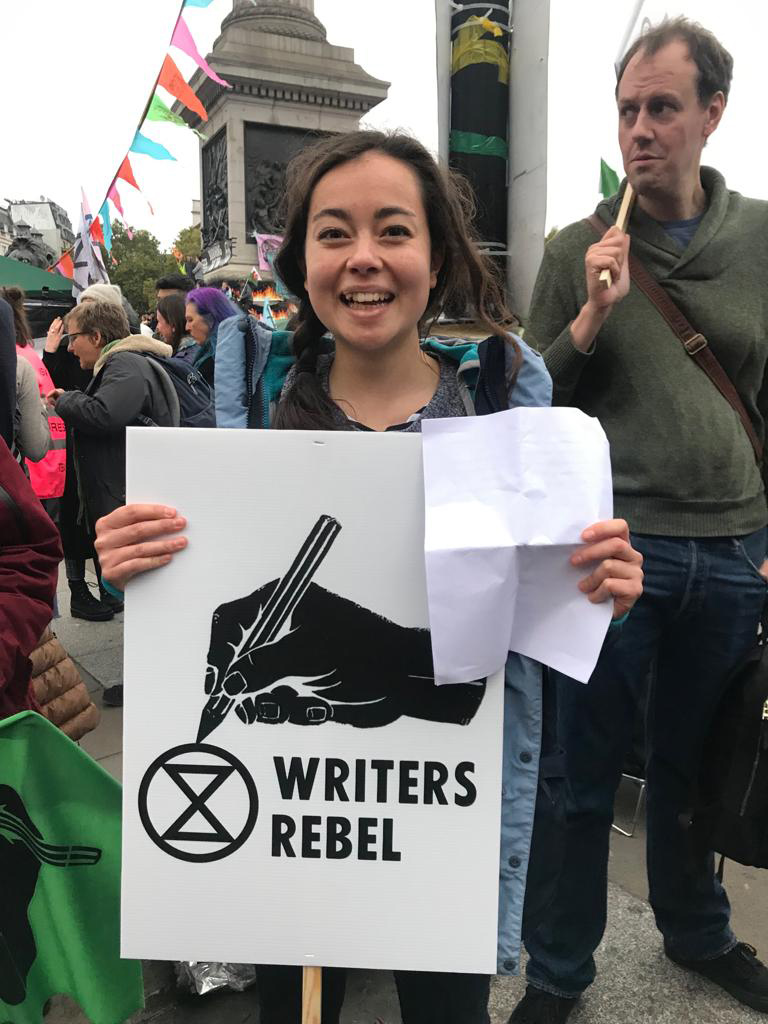
Our youngest performer, writer Naomi Ishiguro
That said, we are very aware that many writers have been campaigning on green issues for a long time, and we failed to invite everyone we should have done. Our next step is to build a database of fiction and non-fiction writers, poets and screenwriters. And thanks to Amitav Ghosh and others, an XR Writers Rebel group is already hatching in New York. We hope there will soon be others too, and we’ll do our best to encourage and facilitate them. We plan to set up a permanent website featuring an events schedule, blogs, a fiction, poetry and non-fiction reading list, and a “Grow Your Own Writers Rebel Group” page.
Writers have often been at the forefront of social change. We are at a critical moment and we need more voices than ever before. There is no cause more urgent and no greater existential threat that the climate and ecological disaster we now face. It affects every living being on the planet.
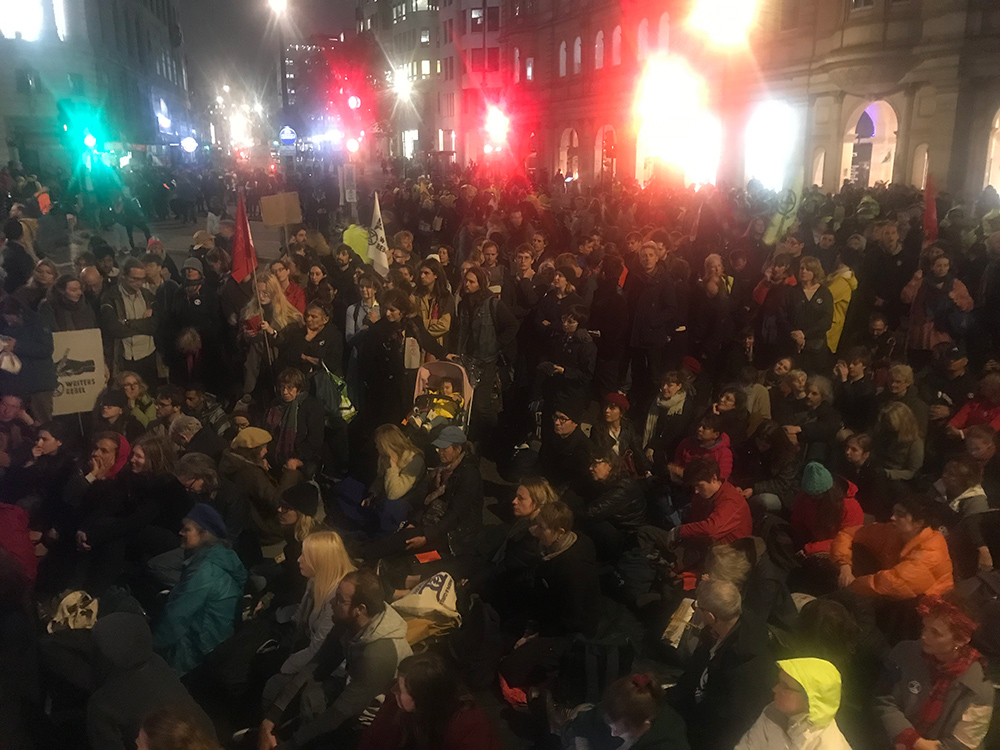
At its height, the event attracted an audience of 1,000 – including about 200 police. You’re welcome, officers!
We speak as writers. But most of all we speak as members of the species that collectively caused this disaster – and can still avert its worst outcomes.
As the great Petra Kelly, co-founder of the German Green Party, said of the challenges facing this century, “If we don’t do the impossible, we shall be faced with the unthinkable.”
XR Writers Rebel UK are: Liz Jensen, Monique Roffey, James Miller, Cath Drake, Roc Sandford, Jessica Townsend and Chloe Aridjis.
More here. www.perspectivainsideout.com/2019/10/08/writers-rebel/
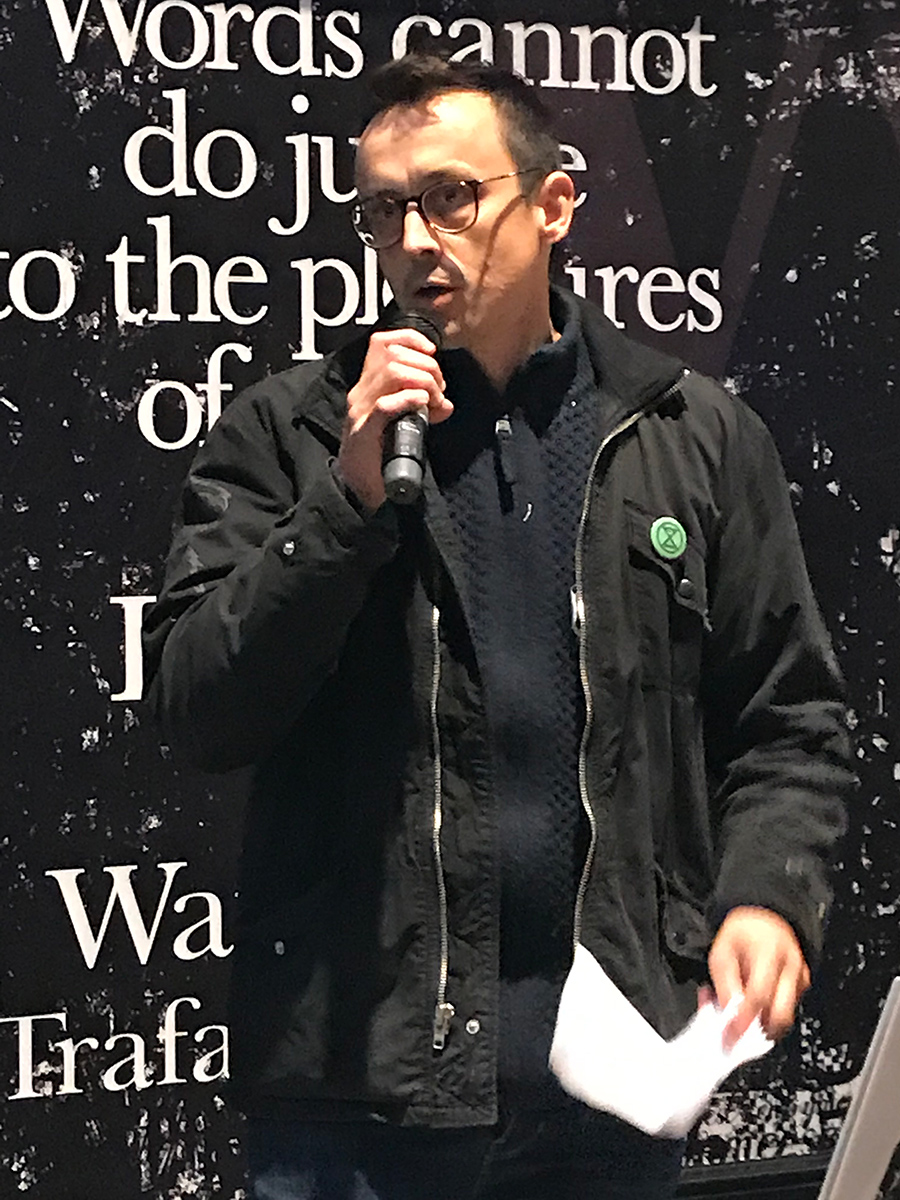
Fresh from a police cell, Tom Bullough spoke movingly about his commitment to the XR cause. Not a dry eye in the house.
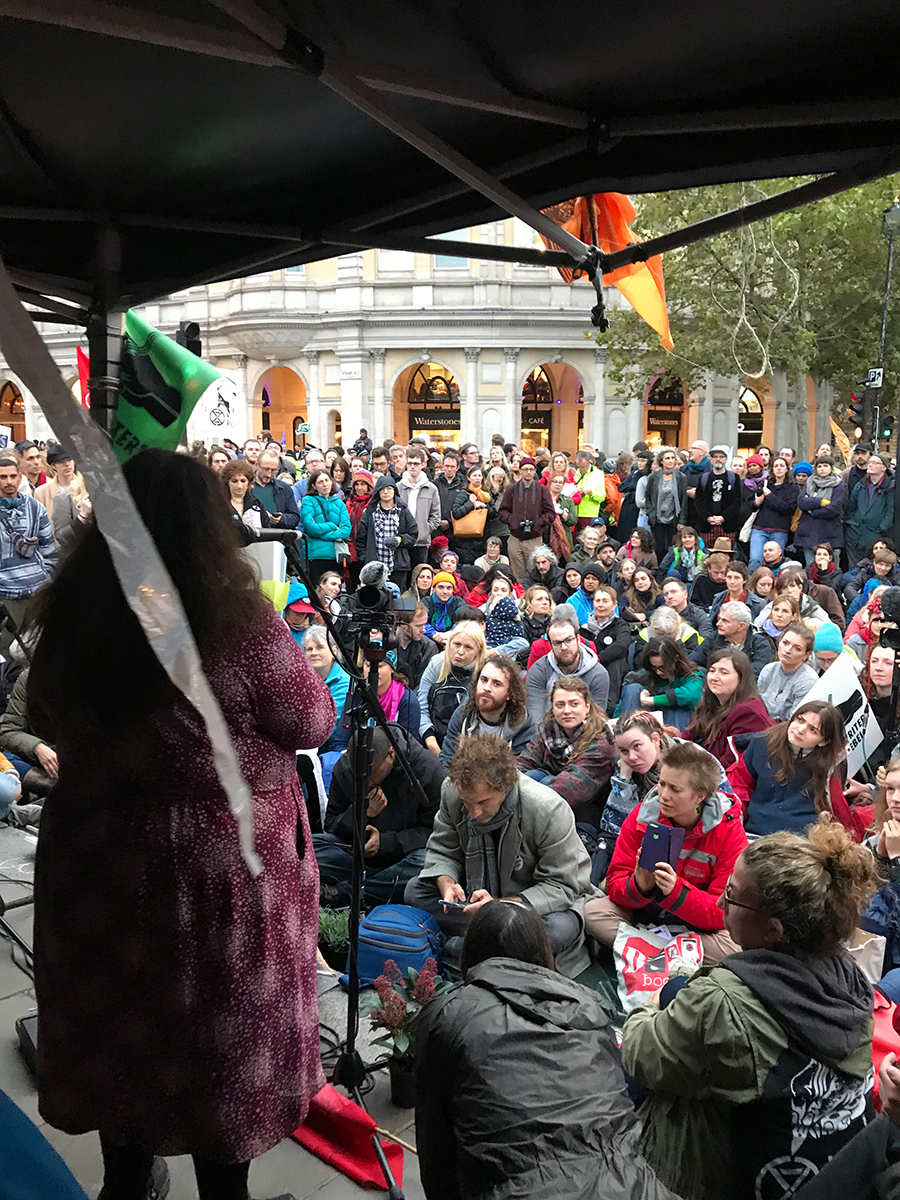
Naomi Alderman wowing the crowd
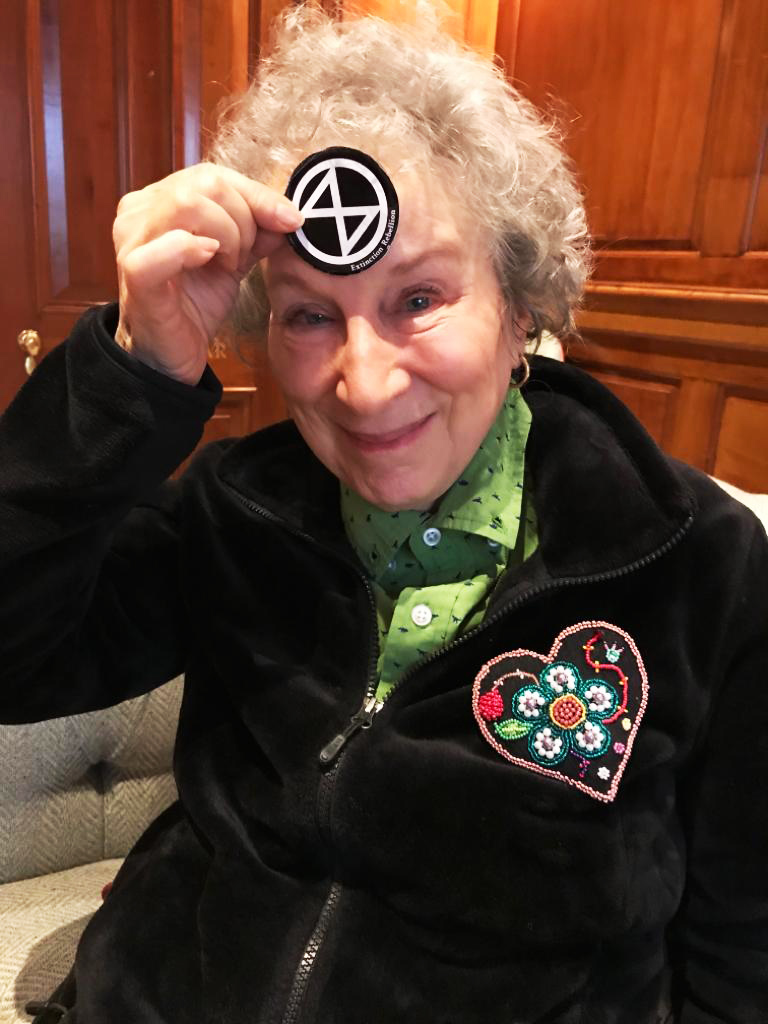
Writers Rebel supporter Margaret Atwood popped into the Extinction Rebellion podcast studio for an interview – just before sharing the Booker Prize with Bernadine Evaristo.
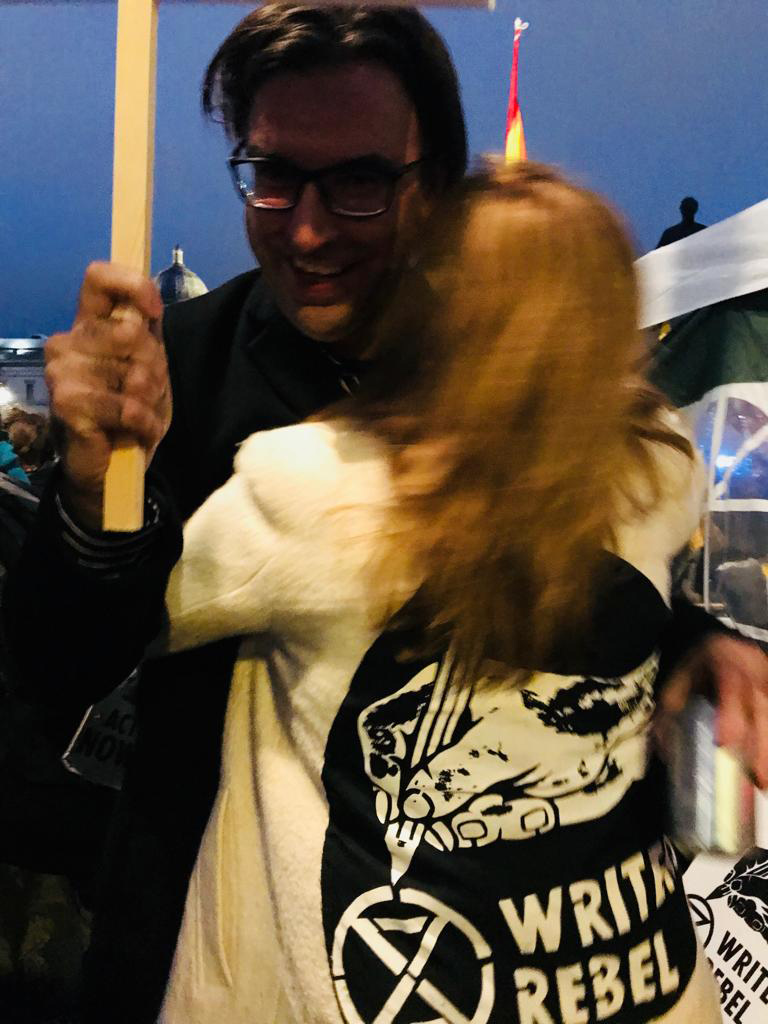
Liz Jensen thanking the brilliant Matt Thorne
Listen to the event on Soundcloud.
For news and updates, follow Writers Rebel @XrRebel on Twitter, and our Facebook page




